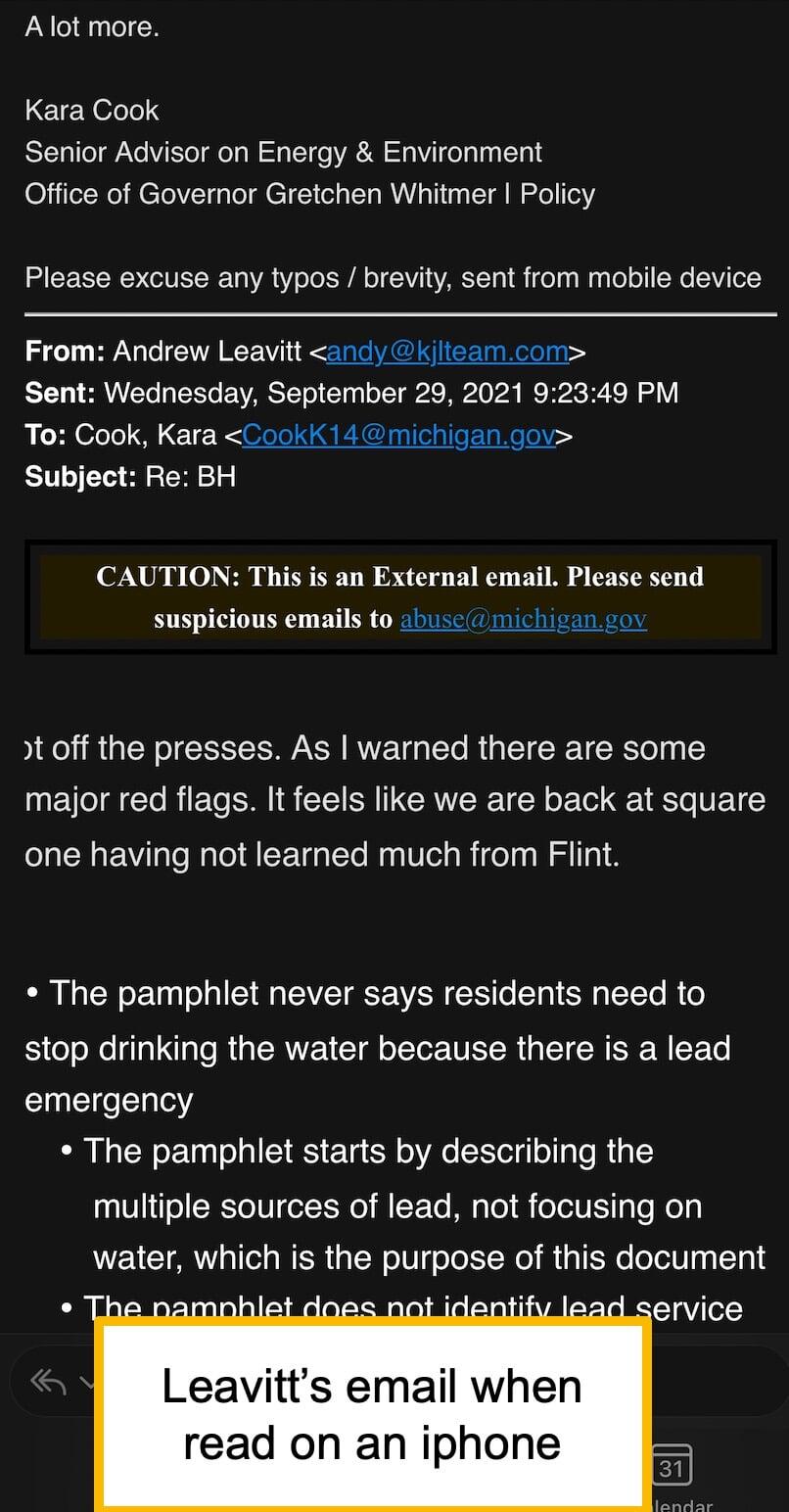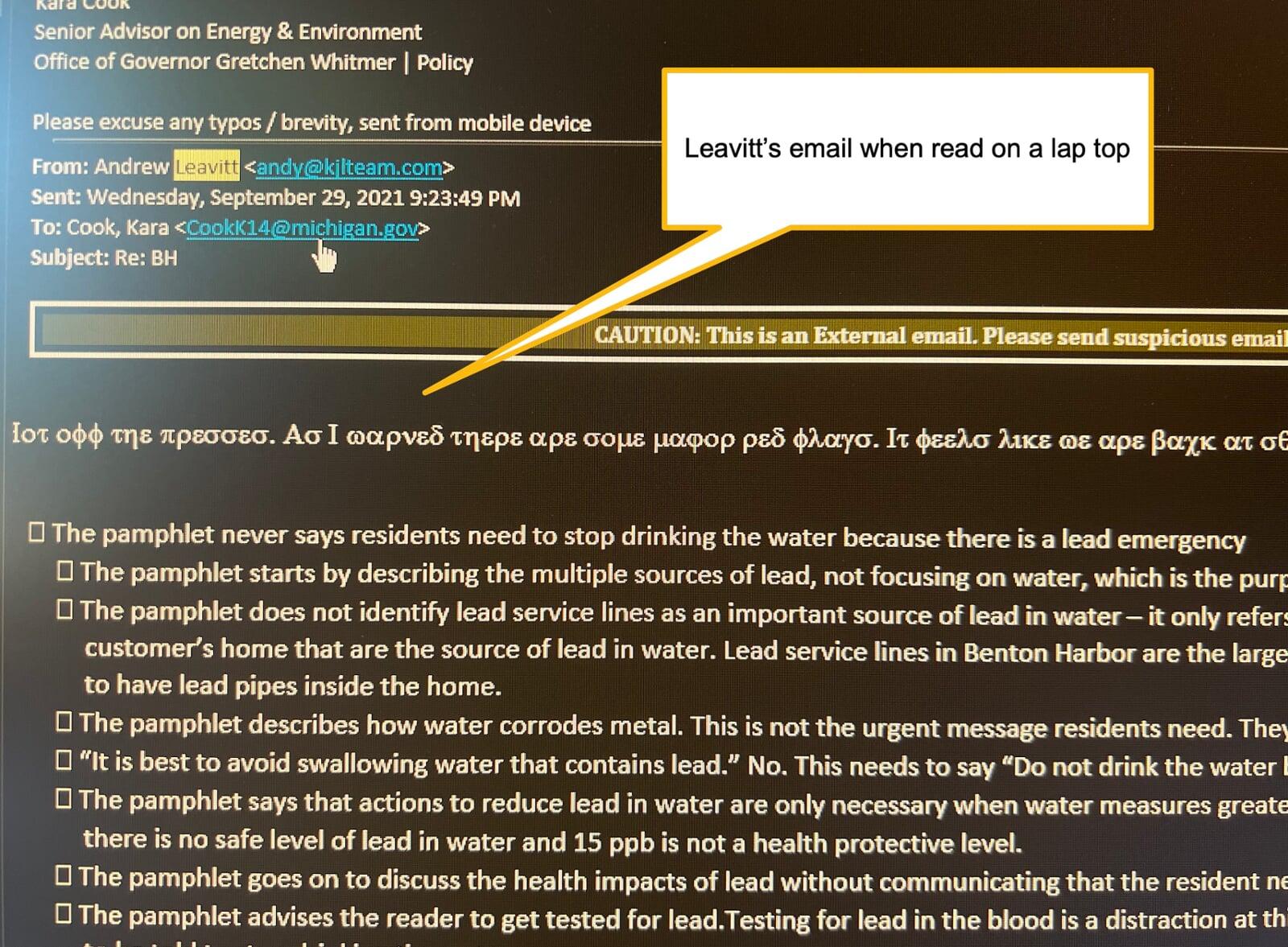(Source: MIRS.news, Published 09/01/2023) An email chain that included a statement from an unpaid advisor to the Department of Environment, Great Lakes, and Energy (EGLE) that showed up in Greek characters during a Freedom of Information Act (FOIA) response has been explained to MIRS as a strange coding glitch that can occur when messages are cut and pasted from some Microsoft word programs into an email.
Andrew Leavitt, a multi-client lobbyist and partner for Khoury Johnson Leavitt, was brought in to provide some perspective on the state government's response to Benton Harbor given his experience staffing former Senate Minority Leader Jim Ananich and U.S. Rep. Dan Kildee during the height of the Flint Water Crisis.
The message from Sept. 29, 2021, reads: “Hot off the presses. As I warned, there are some major red flags. It feels like we are back at square one having not learned much from Flint.”


The FOIA was brought up this week in articles written in the Washington Free Beacon, The Daily Mail, and other conservative media outlets with the direct charge that the Whitmer administration was attempting to hide “critical information” from the public. Fox News and the New York Post have also picked up the story.
Other news outlets have been asking about the Greek characters for weeks, but have held off stories because of a lack of proof that Leavitt, or anyone in state government, intentionally attempted to hide Leavitt's words by using a Greek font.
Michigan Rising Action has since kicked out press releases also claiming the Governor is "dodging public scrutiny with a coded message."
MIRS was supplied with evidence that Leavitt's sentence was cut and pasted in English from another document into an email. When viewed on a cell phone or other programs, Leavitt's message comes out in English. By the time the email thread was complete and the FOIA was filed, a copy of the thread in which the Leavitt message was included appeared in Greek.
Evidence of this happening is not unprecedented, as MIRS has found in this online help article and this one, as well.
Leavitt said the following: “The role of a free press to debunk and correct misinformation campaigns has never been more important. As you can see, the premise of these stories is ridiculous and unfounded. I appreciate the press working to deliver the truth.”
One of the recipients of the email also verified to MIRS that the text came in English and not in Greek characters.
However, the fact is, the FOIA came back with this sentence of critical warning written in Greek, using characters that, by itself, would not be flagged in a word search used by a FOIA coordinator when filling a request.
Abby Mitch of Michigan Rising was skeptical. She questioned why state leaders were so reluctant to initially explain the situation and why the state has been dragging its feet to fill this and other FOIA requests submitted by Michigan Rising and other entities.
She also found it more than coincidental that this message – one that raised questions of the Benton Harbor water situation – happened to be the one that appeared in a FOIA to be written in coded Greek.
“If this is a glitch, then are there others? Can DTMB produce them? If it's a ”glitch," why is the entire email carefully crafted to exclude any specific terminology like ‘Benton Harbor,' but ‘Flint’ is disguised?" Mitch asked.
Finally, there's the timeline. The Leavitt email was sent on Sept. 29, 2021. The message came a week after the state announced it was sending bottled water to the city as the state checked on bringing filters. However, Leavitt's warning came a couple of weeks before the state announced it was pulling all of the lead pipes out of the ground due to elevated lead levels in the city's drinking water.
Gov. Gretchen Whitmer made an unannounced visit to Benton Harbor to meet with residents and local residents after local leaders declared a local emergency due to elevated lead levels in municipal water. A prominent Benton Harbor pastor gave the Governor a four on a 1-10 scale on the state's water response on Oct. 22, roughly three weeks after the Leavitt message.
Whether it was a computer glitch or a deliberate attempt to obfuscate the message from FOIA was a topic for debate. MIRS explores this topic in Thursday night's report. Its editorial team is scheduled to talk about the subject in this coming Monday's podcast.

